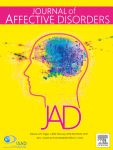Journal of Affective Disorders
Volume 227, February 2018, Pages 219-225

Review article
Efficacy and tolerability of minocycline for depression: A systematic review and meta-analysis of clinical trials
Joshua D.Rosenblat Roger S.McIntyre
Highlights
•
A large antidepressant effect was observed for minocycline compared to placebo.
•
Minocycline had good tolerability with low rates of adverse effects and discontinuation.
•
Future larger RCTs of minocycline for depression are merited.
•
Future studies should also identify subgroups more likely to benefit from minocycline.
Abstract
Background
Minocycline has been identified as a potential novel treatment for depression. The objective of the current review is to determine the overall antidepressant efficacy and tolerability of minocycline.
Methods
Completed and ongoing clinical trials of minocycline for depression (both bipolar and unipolar) published prior to September 12, 2017 were identified through searching relevant databases. Using a random-effects model, data from randomized controlled trials (RCTs) were pooled to determine the antidepressant effect size of minocycline compared to placebo. Relative risk of all-cause discontinuation was determined to assess overall tolerability.
Results
Eighteen clinical studies (including published and unpublished RCTs, open label studies, ongoing clinical trials and a case report) were identified for inclusion in the qualitative synthesis. Only three RCTs (n = 158) met inclusion criteria for quantitative synthesis. The overall antidepressant effect size of minocycline compared to placebo was − 0.78 [95% confidence interval − 0.4 to − 1.33 (P = 0.005)], indicative of a large and statistically significant antidepressant effect. Heterogeneity of the pooled sample was moderate (I2 = 62%). There was no statistically significant difference in reported adverse effects or all-cause discontinuation in the minocycline group compared to placebo (p = 0.16).
Limitations
The small number of published RCTs, small sample sizes, heterogeneity of included studies, and potential publication bias were significant limitations.
Conclusions
Overall, a large antidepressant effect was observed for minocycline compared to placebo with good tolerability. The current analysis provides a proof-of-concept for the antidepressant effects of minocycline and provides impetus for future larger RCTs as well as identification of subgroups more likely to benefit from this intervention.
https://www.sciencedirect.com/science/article/pii/S0165032717319985
Volume 227, February 2018, Pages 219-225

Review article
Efficacy and tolerability of minocycline for depression: A systematic review and meta-analysis of clinical trials
Joshua D.Rosenblat Roger S.McIntyre
Highlights
•
A large antidepressant effect was observed for minocycline compared to placebo.
•
Minocycline had good tolerability with low rates of adverse effects and discontinuation.
•
Future larger RCTs of minocycline for depression are merited.
•
Future studies should also identify subgroups more likely to benefit from minocycline.
Abstract
Background
Minocycline has been identified as a potential novel treatment for depression. The objective of the current review is to determine the overall antidepressant efficacy and tolerability of minocycline.
Methods
Completed and ongoing clinical trials of minocycline for depression (both bipolar and unipolar) published prior to September 12, 2017 were identified through searching relevant databases. Using a random-effects model, data from randomized controlled trials (RCTs) were pooled to determine the antidepressant effect size of minocycline compared to placebo. Relative risk of all-cause discontinuation was determined to assess overall tolerability.
Results
Eighteen clinical studies (including published and unpublished RCTs, open label studies, ongoing clinical trials and a case report) were identified for inclusion in the qualitative synthesis. Only three RCTs (n = 158) met inclusion criteria for quantitative synthesis. The overall antidepressant effect size of minocycline compared to placebo was − 0.78 [95% confidence interval − 0.4 to − 1.33 (P = 0.005)], indicative of a large and statistically significant antidepressant effect. Heterogeneity of the pooled sample was moderate (I2 = 62%). There was no statistically significant difference in reported adverse effects or all-cause discontinuation in the minocycline group compared to placebo (p = 0.16).
Limitations
The small number of published RCTs, small sample sizes, heterogeneity of included studies, and potential publication bias were significant limitations.
Conclusions
Overall, a large antidepressant effect was observed for minocycline compared to placebo with good tolerability. The current analysis provides a proof-of-concept for the antidepressant effects of minocycline and provides impetus for future larger RCTs as well as identification of subgroups more likely to benefit from this intervention.
https://www.sciencedirect.com/science/article/pii/S0165032717319985
